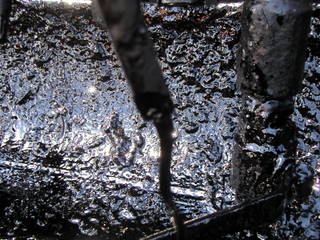
Mark Oliver is blogging today (Nov 2) and tomorrow from the 13th Sheffield International Documentary Film Festival on some of the dozens of current affairs films that are showing.
"Oil is the excrement of the devil ... oil is the bloodstream of the world economy, oil is the blood of the dinosaurs, blood of the earth."
This is from the opening of A Crude Awakening: the Oil Crash, a Swiss-made documentary, and one of the most frightening films you are ever likely to see.
A parade of oil industry experts, politicians and academics outline in shocking detail just how badly life could be impacted after the world's oil reserves have peaked - and claim we are just about at the peak now. Standards of living - not just for the developing world but also for the West - could be forced to dramatically shrink.
There is little optimism that other energy sources can fill the void, especially as China and India grow. The film points out that there is a general ignorance about how many things are derived from oil, not least plastics.
Some believe a reduced, post-oil global economy will only be able to cope with pre-oil population levels of around 2 billion people - not the forecast 9 billion by 2100. More than one person in the film talks about a looming depression of intense severity.
Dr David Goodstein, a physics professor at the California Institute of Technology, says: "A graduate student asked me 'will my children ever ride in an airplane?' It was a gripping question. The answer could well be no." Matthew David Savinar, of lifeaftertheoilcrash.net, says that only the mega-rich 0.1% might be able to travel by cars and planes.
Dr Goodstein says that it would take 10,000 new nuclear power stations to replace the energy created by oil but even then "the world's uranium would be gone in one or two decades".
Developing hydro cell cars is important but would only temporarily slow down the end of the oil. Wind and wave power is described as offering only small contributions. Dr Goodstein is most optimistic about solar power, but says developing this technology is a huge challenge - and nobody is doing enough research right now.
Terry Lynn Karl, a peak oil expert, argues that oil is a factor in more conflicts, beyond Iraq, than people appreciate. She says that the conflict in Darfur, often described as ethnic in nature, is also about the government trying to force a group of people away from oil fields.
She also paints a gloomy picture of what is happening in Saudi Arabia, noting that the average salary has dropped from $28,000 (£14,670) to $6,000 in 10-15 years. There are fears that the Saudi regime will collapse under pressure from Islamist militants and nobody seems to doubt that the US would intervene in such a scenario. Ms Karl says that in the future there could be "war after war" overtly about oil.
Roscoe Bartlett, a scientist and Republican congressman for Maryland, says a barrel of oil can produce as much energy as 12 human beings physically working all year. It can cost just $1 to get a barrel of Iraqi oil out of the ground. Never has so much power been achieved so cheaply.
At the Sheffield festival, David Sag, chief executive of Carbon Planet, said A Crude Awakening was an important film, like Al Gore's Inconvenient Truth, but you may not want to watch them both on the same day, if you don't want to be terrified.
He agreed that climate change and peak oil are related but separate disasters looming in the future. "And one of the solutions for both of them is for a massive shrinking of the economy," he said. "But who is going to vote for that?"

No comments:
Post a Comment